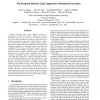Free Online Productivity Tools
i2Speak
i2Symbol
i2OCR
iTex2Img
iWeb2Print
iWeb2Shot
i2Type
iPdf2Split
iPdf2Merge
i2Bopomofo
i2Arabic
i2Style
i2Image
i2PDF
iLatex2Rtf
Sci2ools
109
click to vote
ISCA
1999
IEEE
1999
IEEE
The Program Decision Logic Approach to Predicated Execution
Modern compilers must expose sufficient amounts of Instruction-Level Parallelism (ILP) to achieve the promised performance increases of superscalar and VLIW processors. One of the major impediments to achieving this goal has been inefficient programmatic control flow. Historically, the compiler has translated the programmer's original control structure directly into assembly code with conditional branch instructions. Eliminating inefficiencies in handling branch instructions and exploiting ILP has been the subject of much research. However, traditional branch handling techniques cannot significantly alter the program's inherent control structure. The advent of predication as a program control representation has enabled compilers to manipulate control in a form more closely related to the underlying program logic. This work takes full advantage redication paradigm by abstracting the program control flow into a logical form referred to as a program decision logic network. This...
Related Content
| Added | 03 Aug 2010 |
| Updated | 03 Aug 2010 |
| Type | Conference |
| Year | 1999 |
| Where | ISCA |
| Authors | David I. August, John W. Sias, Jean-Michel Puiatti, Scott A. Mahlke, Daniel A. Connors, Kevin M. Crozier, Wen-mei W. Hwu |
Comments (0)

